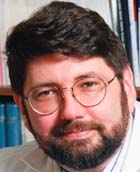Four physician-scientists in the School of Medicine were recently honored by the American Society for Clinical Investigation (ASCI), one of the nation’s oldest and most respected medical honor societies.

Daniel C. Brennan, M.D., associate professor of medicine; David M. Holtzman, M.D., the Charlotte and Paul Hagemann Professor of Neurology and professor of molecular biology and pharmacology; Barry P. Sleckman, M.D., Ph.D., assistant professor of pathology and immunology; and Dwight A. Towler, M.D., Ph.D., associate professor of molecular biology and pharmacology and of medicine, were formally inducted as ASCI members at the group’s annual meeting in April in Chicago.
The ASCI comprises more than 2,700 physician-scientists from all medical specialties. The association publishes the Journal of Clinical Investigation and is a member of the Federation of American Societies for Experimental Biology (FASEB), an umbrella organization of biomedical research societies.

According to Herbert W. “Skip” Virgin IV, M.D., Ph.D., the medical school’s ASCI institutional representative, becoming a member of the association is an important recognition for young biomedical researchers.
“There’s a perception among clinical trainees (fellows, residents and interns) that it’s very difficult to do biomedical research with a clinical background,” said Virgin, who also is a professor of pathology and immunology. “While there are many challenges, I think it’s good they see that some of the faculty who teach them have actually succeeded at doing something substantial.”
Individuals nominated for ASCI membership must be under age 45 and have made substantial contributions to biomedical research at a national level.
In 2004, the association received 159 membership nominations; 64 were elected.

Currently, about 65 School of Medicine faculty have been ASCI members. Past presidents of the association include faculty members Carl V. Moore, M.D. (1954); Philip W. Majerus, M.D. (1982); and Timothy J. Ley, M.D. (1998).
One of the ASCI’s chief goals is to further involve junior investigators with medical degrees in biomedical research — to mentor them and to encourage them to proceed with their academic careers. One of the biggest obstacles young physicians face is financial indebtedness.
The specters of postponing the payment of medical school debts and the delay in receiving a “real world” salary during lengthy postdoctoral years loom large, said Ley, the Alan A. and Edith L. Wolff Professor in Medicine and professor of genetics. The typical medical student averages more than $100,000 in debt upon graduation (at WUSTL, that number is just over $90,000, including undergraduate education).

These and other factors inspired the FASEB board to undertake a study of the decline in physicians pursuing research careers, an initiative led by Ley.
The results, published in 2000, convinced FASEB, ASCI and others to recommend to the National Institutes of Health (NIH) that loan repayment programs be put in place for young physician-scientists who commit to working in a laboratory for at least three years with a serious intent to pursue a career in research.
Congress authorized the creation of a loan repayment program for extramural NIH grants in 2001.
So far, that program looks to be a success. Now entering its third year, more than 1,000 people should be participating in the program by the end of 2004, a number that is actually larger than originally anticipated.
“Daniel Brennan, the first director of transplant nephrology at Washington University, is internationally known for his studies on infectious complications of kidney transplantation. His research has resulted in the implementation of strategies that have markedly improved renal transplantation outcomes.”
— Marc R. Hammerman, M.D., the Chromalloy Professor of Renal Diseases in Medicine and professor of cell biology and physiology
“David is a superior physician-scientist who has been at the cutting edge of the rapidly evolving field of the molecular basis of Alzheimer’s disease. His studies are original and have high impact. In addition, he is an excellent clinician and teacher.”
— Alan L. Schwartz, Ph.D., M.D., the Harriet B. Spoehrer Professor and head of pediatrics
“Barry is a major contributor to the understanding of a fundamental problem in how lymphocytes recognize foreign proteins. He also happens to be an outstanding teacher. He’s very dedicated to the people in his lab, and he still does experiments. He is one of those people who does outstanding work and is also a wonderful contributor to the institution.”
— Herbert W. “Skip” Virgin IV, M.D., Ph.D., professor of pathology and immunology
“Focusing on the biology of mineralization and its relevance to human disease, Dwight Towler has made important and creative contributions to our understanding of how gene expression contributes to bone formation and how calcification in blood vessels occurs. These two processes are critically important to normal human health and to complications associated with atherosclerosis.”
— Clay F. Semenkovich, M.D., professor of medicine and of cell biology and physiology